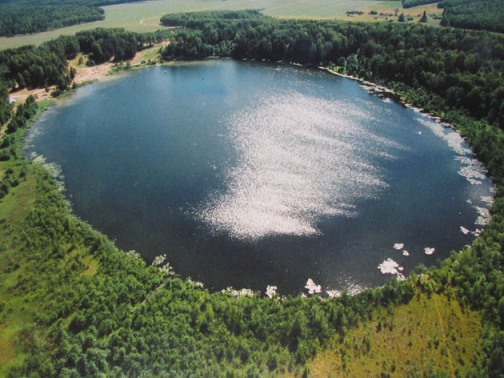

Lake Svetloyar in Rostov Oblast is a mysterious
perfectly rounded lake. Russian legends claim it is a site of a
Russian Atlantis- town of Kitezh. The lake is located between the
rivers Kerzhenets and Vetluga, left tributaries of the Volga. The
surface area is 0.1483 km². It has the shape of an oval with
dimensions of 470 × 350 m with a long axis in the north-south
direction, differs from neighboring lakes in its great depth,
reaching 33.4 m. The deepest point is in the southern part of the
lake, where the lowering of the bottom has the shape of a funnel,
which is a continuation steep southern shores. To the north of this
depression, at the bottom, there is a flat area 22-24 m deep. In the
northern, relatively shallow part of the lake, the depth differences
are smoother than in the southern part. The height of the lake
surface above sea level is 109 m. The shores of the lake are
somewhat elevated, and the lake itself is located in a basin; the
hills surrounding the lake are most pronounced from the south, where
they form an arc. The height of the hills reaches 122-124 m above
sea level (13-15 m above the water line of the lake), the hills are
separated by deep (7-8 m) ravines. Unusually clear water of the
hydrocarbonate-calcium type, transparent to a depth of more than 5
m. The lake is cold, it is fed by numerous bottom springs. The banks
are slightly swampy. A small shallow river Lunda flows 0.5 km to the
north-east, with which the lake is connected by a stream. The runoff
from the lake through the stream, partially disturbed during the
construction of the road during the Soviet era (as a result, the
lake began to become swampy), was restored in the 1990s.
The
volume of the lake basin (not the lake itself) is about 1.5 km³, the
area of the water surface is 14.83 hectares. The bottom sediments
are about 8 m thick.
Kitezh (Kitezh-grad, city of Kitezh, Bolshoi
Kitezh) is a messianic city located, according to legend, in the
northern part of the Nizhny Novgorod region, near the village of
Vladimirskoye, on the shores of Lake Svetloyar near the Lyunda
River.
The basis for the Svetiyarsk cult was the "Kitezh
Chronicler" ("The Book, the Verb Chronicler ..."), a monument
presumably created among the Old Believers-runners in the 80s-90s of
the 18th century. Another important monument is "The Tale and the
Punishment of the Secret City of Kitezh". The legend became famous
in the educated circles of Russia thanks to the epic novel "In the
Woods" by PI Melnikov-Pechersky. It served as the basis for many
works of art - in particular, the opera by N. A. Rimsky-Korsakov
"The Legend of the Invisible City of Kitezh and the Maiden
Fevronia."
Melnikov-Pechersky expounds the legend
as follows:
And even lower, beyond the Kama, the steppes are
spread out, the people there are different: although Russian, but
not the same as in the Upper. There is a new settlement, and in the
Trans-Volga Upper reaches, Russia has settled down in forests and
swamps from olden times. Judging by the people's dialectic dialect,
Novgorodians settled there in the old Rurik times. Legends about
Batu's defeat are fresh there. They will also point out the "Batyev
trail" and the place of the invisible city of Kitezh on Lake Svetly
Yar. That city is still intact - with white-stone walls,
golden-domed churches, with honest monasteries, with patterned
princely chambers, with boyar stone chambers, with houses chopped
from a condo, rotting forest. The hail is intact, but invisible.
Sinful people cannot see glorious Kitezh. He hid miraculously, by
God's command, when the godless Tsar Batu, having ruined the Rus of
Suzdal, went to fight the Rus of Kitezh. The Tatar king approached
the city of Great Kitezh, wanted to burn the houses with fire, beat
husbands or drive them away, take wives and girls as concubines. The
Lord did not allow the Mongol desecration of the Christian shrine.
For ten days, ten nights, the Batu hordes were looking for the city
of Kitezh and could not find, blinded. And hitherto that city is
invisible - it will open before the terrible judgment seat of
Christ. And on the lake Svetly Yar, on a quiet summer evening, one
can see walls reflected in the water, churches, monasteries,
princely mansions, boyar mansions, courtyards of townspeople. And at
night you can hear the dull, mournful ringing of the Kitezh bells.